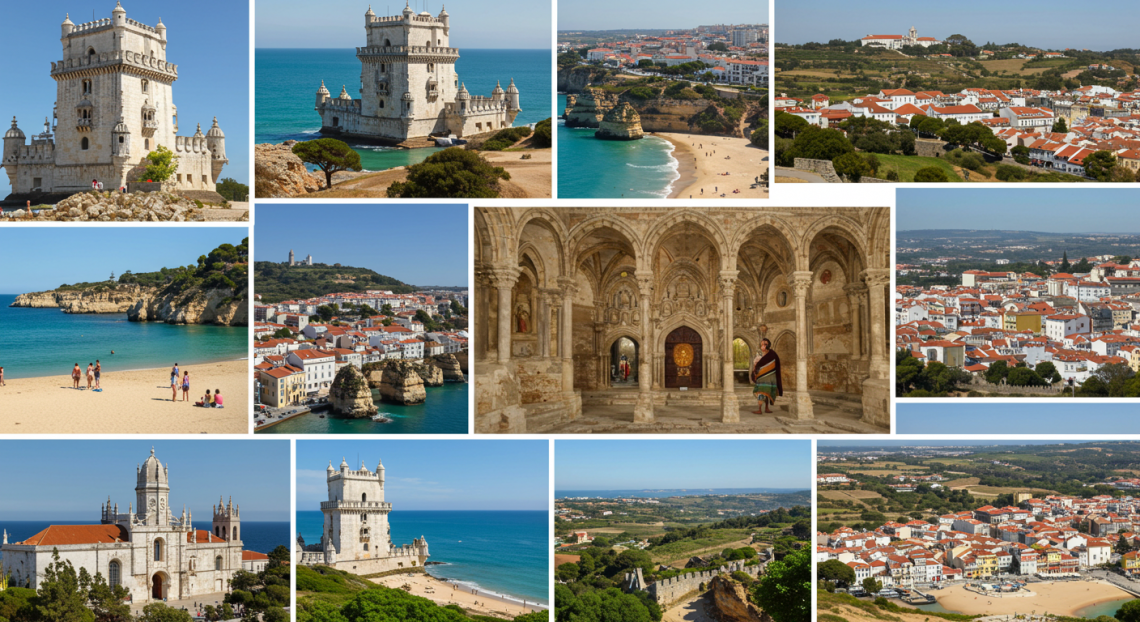
Exploring Portugal: Your Guide to Different Visa Types!
Thinking about heading to Portugal? Whether it’s for a short getaway, a long-term stay, or even a fresh start, you’ll need the right visa to get there. Portugal’s got a bunch of visa options depending on what you need. From the quick Schengen Visa for short trips to the enticing Golden Visa for investors, there’s something for everyone. Let’s break down the different types of visas Portugal offers, so you can figure out which one suits your plans best.
Key Takeaways
- Portugal offers a variety of visas for different needs, including short stays, long-term residency, and investment opportunities.
- The Schengen Visa is perfect for those looking to visit Portugal for up to 90 days, whether for tourism or business.
- For those planning to stay longer, options like the Temporary Stay Visa or Long-Stay Visa provide pathways to residency.
- The D7 Visa is ideal for retirees or individuals with passive income, while the D8 Digital Nomad Visa caters to remote workers.
- Investors can benefit from the Golden Visa, which offers residency in exchange for investment in Portugal.
Understanding the Schengen Visa for Short Stays
The Schengen Visa is your ticket to exploring Portugal and other European countries for up to 90 days within a six-month period. Whether you’re planning a vacation, visiting family, or attending a business meeting, this visa allows you to travel freely within the Schengen Area.
Eligibility Criteria for Schengen Visa
To be eligible for a Schengen Visa, you’ll need to meet several criteria. First, you must have a valid passport with at least two blank pages. You’ll also need to demonstrate sufficient financial means to support yourself during your stay. This often involves providing bank statements or proof of income. Additionally, you must have travel insurance covering medical emergencies, with a minimum coverage of €30,000.
Application Process for Schengen Visa
Applying for a Schengen Visa involves several steps. First, gather all necessary documents, including your passport, application form, and recent photographs. Next, schedule an appointment with the Portuguese embassy or consulate in your country. During your appointment, submit your application and pay the visa fee, which is typically €80 for adults. Remember, applications should be submitted at least 15 days before your planned travel date but no more than six months in advance.
Benefits of Schengen Visa
Holding a Schengen Visa offers numerous benefits. It allows you to travel across 26 European countries without the need for additional visas, making it ideal for those planning a multi-country European trip. Moreover, it simplifies travel logistics, as you only need to deal with one visa application instead of multiple. This visa also enhances your travel experience by allowing you to explore diverse cultures and landscapes within a single trip.
Traveling through Portugal and beyond with a Schengen Visa offers a seamless experience, letting you experience the rich tapestry of European cultures without the hassle of border checks.
Exploring the Temporary Stay Visa Options

Temporary Stay Visas are a great choice if you’re planning to be in Portugal for more than a quick visit but aren’t ready for a long-term commitment. These visas are perfect for stays longer than 90 days but less than a year, offering flexibility without the need for permanent residency.
Who Should Apply for a Temporary Stay Visa
A Temporary Stay Visa is ideal for those who need to be in Portugal for several months. Whether you’re there for work, study, or medical treatment, this visa is your go-to option. It’s mandatory for third-country nationals planning to stay more than 90 days but less than a year.
- Work: If you’re taking on temporary employment or self-employment.
- Study: Students enrolled in short-term courses or programs.
- Medical Treatment: Patients receiving medical care or accompanying a family member undergoing treatment.
Required Documentation for Temporary Stay Visa
Getting your Temporary Stay Visa requires a bit of paperwork, but it’s manageable. Here’s what you’ll need:
- Passport or valid ID: Ensure it’s up-to-date.
- Two passport photos: Standard size.
- Return travel ticket details: Proof of your planned departure.
- Valid health insurance: Covering your stay in Portugal.
- Proof of accommodation: Could be a rental agreement or a letter from a host.
- Financial proof: Show you can support yourself financially during your stay.
- Criminal record: Access by Portuguese immigration is required.
Duration and Renewal of Temporary Stay Visa
These visas allow you to stay in Portugal for up to one year, with multiple entries permitted. This means you can leave and re-enter the country as needed. If you find yourself needing more time, consider applying for a renewal or transitioning to a different visa type if your circumstances change.
A Temporary Stay Visa is your ticket to experiencing life in Portugal for an extended period, whether for work, study, or health reasons. It’s a flexible option that opens the door to new opportunities without the long-term obligation of residency.
For more detailed information on the types of Temporary Stay Visas available, check out this guide which outlines options for medical treatment and accompanying family members undergoing treatment.
Long-Stay Visas: A Pathway to Residency
Types of Long-Stay Visas Available
Long-stay visas in Portugal are designed for those planning to settle down for more than a year. These visas open doors to various lifestyles, whether you’re looking to work, study, or retire. Here are a few options:
- D7 Visa: Ideal for retirees and passive income earners. It allows you to enjoy Portugal’s beauty while receiving income from abroad.
- D8 Digital Nomad Visa: Perfect for remote workers. Show proof of income and you’re set to work with Portugal as your backdrop.
- Golden Visa: An investment-based visa, offering residency through financial ventures like real estate or job creation.
Steps to Apply for a Long-Stay Visa
Applying for a long-stay visa involves several steps, but it’s manageable with the right preparation. Here’s a simple rundown: First, you’ll need to gather all necessary documents, such as your passport, proof of accommodation, and financial statements. It’s important to fill out the application form accurately and completely to avoid any delays. For a clearer understanding, check out resources that provide visa application steps explained to ensure you comply with all requirements. Additionally, be mindful of the specific visa application steps and requirements that may vary depending on your destination country. Once your application is submitted, you may be required to attend an interview or provide additional documentation, so stay prepared. Keeping track of deadlines and regularly checking for updates on your application status can also help to streamline the process and reduce any anxiety associated with waiting.
- Choose the Right Visa: Determine which type suits your lifestyle and goals.
- Gather Necessary Documents: This includes a valid passport, proof of income, and a clean criminal record.
- Submit Your Application: Apply through the Portuguese consulate or embassy in your home country.
- Await Approval: Once approved, make your move to Portugal.
“Securing a temporary residence permit is your next step after obtaining a long-stay visa. It’s your ticket to living in Portugal long-term.” Once you have your temporary residence permit, you can enjoy various benefits, including access to local services and the ability to work legally in the country. To ensure a smooth transition and avoid any complications, it’s essential to understand how to apply for residency in Portugal, which typically involves gathering necessary documents and meeting specific requirements. By following the proper procedures, you’ll be well on your way to establishing a fulfilling life in this beautiful European nation.
Advantages of Holding a Long-Stay Visa
Having a long-stay visa in Portugal comes with perks that make the process worthwhile:
- Access to Residency: Enjoy the benefits of being a resident, including healthcare and education.
- Freedom to Travel: With a long-stay visa, you can travel within the Schengen Area without additional visas.
- Path to Citizenship: After five years, you can apply for permanent residency or even citizenship, making Portugal your permanent home.
Long-stay visas are more than just a ticket to Portugal; they are a pathway to a new life filled with opportunities and adventures.
The D7 Visa: Ideal for Passive Income Earners
Eligibility for the D7 Visa
The D7 Visa is a fantastic option for those who earn a steady passive income and wish to enjoy the serene life Portugal offers. This visa is particularly popular among retirees and those living off dividends, rental income, or pensions. To be eligible, your passive income should at least match the Portuguese minimum wage. If you have a spouse or children, you’ll need to show additional income—50% more for a spouse and 30% more for each child. Besides income, you’ll need proof of sufficient savings to cover any income gaps, ideally 12 months’ worth of the minimum wage, plus extras for dependents.
Application Process for the D7 Visa
Applying for the D7 Visa involves a few steps, starting from your home country. First, fill out the D7 application form and gather essential documents like a valid passport, proof of income, and a clean criminal record. Once you submit your application, you’ll book an appointment with the Portuguese immigration authorities to provide biometric data. After approval, you’ll receive a temporary visa to enter Portugal, where you can then apply for your residency card.
Benefits of the D7 Visa
The D7 Visa not only grants you residency in Portugal but also opens the door to the Schengen Area for travel. It provides access to Portugal’s public services, such as healthcare and education, and can be a stepping stone to permanent residency or even citizenship after five years. This visa is a zero-investment path to living in Portugal, making it an attractive option for those who want to enjoy the country’s high quality of life without major financial commitments.
Portugal’s welcoming culture and beautiful landscapes make it an appealing choice for those looking to settle down with financial security. With the D7 Visa, you can enjoy a relaxed lifestyle while exploring the richness of this European gem.
Golden Visa: Investment Opportunities in Portugal
The Golden Visa program is a unique opportunity for non-EU nationals to gain residency in Portugal by making significant investments. This residency-by-investment scheme is particularly attractive to those looking to enjoy Portugal’s vibrant culture, stable economy, and favorable tax incentives. Let’s explore the various avenues available for securing a Golden Visa.
Investment Options for Golden Visa
Portugal offers several investment options for those seeking a Golden Visa. These include:
- Investment Funds: Contribute €500,000 or more to acquire units in investment or venture capital funds. These funds must primarily support Portuguese companies and have a maturity of at least five years.
- Business Investment: Establish a company or invest in an existing one with a minimum of €500,000, creating or maintaining at least five permanent jobs for three years. You can benefit from a 20% discount if investing in a low-density area.
- Scientific Research: Transfer at least €500,000 towards research activities conducted by national scientific institutions. A 20% discount applies for investments in designated low-density areas.
- Cultural Heritage Contribution: Donate a minimum of €250,000 to support artistic endeavors or refurbish national heritage sites. Again, a 20% discount is available for low-density areas.
Application Requirements for Golden Visa
To apply for the Golden Visa, you must:
- Maintain a clean criminal record.
- Be a non-EU, non-Swiss, or non-EEA national.
- Invest at least €250,000 in one of the approved options.
- Spend an average of 7 days per year in Portugal, totaling 14 days during each two-year period of the residence permit’s validity.
Long-Term Benefits of the Golden Visa
The Golden Visa is not just about residency; it opens doors to numerous benefits:
- Pathway to Portuguese citizenship after five years, allowing you to live, work, and study in Portugal.
- Minimal physical presence required, letting you maintain your lifestyle while enjoying the perks of a Portugal residence permit.
- Family reunification is possible, making it an ideal choice for expats in Portugal visa guide.
The Golden Visa program is a gateway not only to Portugal but to the entire Schengen Area, offering unparalleled freedom and flexibility for global citizens.
For those considering a move, understanding the Portugal residence permits can help you plan your journey to this beautiful country, known for its diverse weather and welcoming culture.
D8 Digital Nomad Visa: Embrace Remote Work in Portugal
Who Can Apply for the D8 Digital Nomad Visa
The Portugal Digital Nomad Visa, officially called the D8 Visa, is a fantastic opportunity for freelancers, remote workers, and entrepreneurs who are eager to live and work in Portugal. This visa is tailored for those who aren’t part of the EU, EEA, or Switzerland. To qualify, you need to prove a steady income that’s at least four times the Portuguese minimum wage, which is around €3,480 per month. Additionally, you must either rent or own a property in Portugal, showcasing your commitment to residing there.
Application Steps for the D8 Visa
Applying for the D8 Visa involves a few key steps:
- Gather Required Documents: Ensure you have your taxpayer identification number (NIF), a Portuguese bank account, proof of income, and a clean criminal record.
- Submit Your Application: Apply at the nearest Portuguese consulate in your home country.
- Enter Portugal: Once approved, travel to Portugal and begin the process of obtaining your residency permit.
- Finalizing Residency: Visit the immigration office in Portugal to finalize your residency permit, which initially lasts for two years but can be extended.
Living in Portugal as a Digital Nomad
Living in Portugal with the D8 Visa offers a unique blend of work and leisure. Enjoy visa-free travel across the Schengen area, and potentially benefit from Portugal’s favorable tax regime. The country is not only known for its beautiful landscapes and rich culture but also for its welcoming community of digital nomads. While the cost of living is relatively low, the quality of life is high, making it an ideal spot for remote workers seeking a balance between work and personal life.
Portugal is more than just a place to work; it’s a place to live, explore, and grow. With its warm climate, friendly locals, and vibrant cities, it’s no wonder digital nomads are flocking here to set up their remote offices.
Family Reunion Visa: Bringing Loved Ones Together
Eligibility for Family Reunion Visa
If you’re a legal resident in Portugal, you can apply for the Family Reunion Visa to bring your immediate family members over. This includes spouses, dependent children, and sometimes even parents or siblings, depending on their dependency status. It’s crucial that the sponsor has legal residency in Portugal, which means you must already hold a residence permit.
Application Process for Family Reunion Visa
- Gather Necessary Documents: You’ll need proof of your legal residency, financial means to support your family, and suitable accommodation in Portugal.
- Schedule an Appointment: Set up a meeting with the Portuguese Immigration and Borders Service (SEF).
- Submit Application: Present all required documents during your SEF appointment.
- Await Approval: The process can take a few months, so patience is key.
Rights and Benefits of Family Reunion Visa
Once approved, your family members can access Portugal’s national health system and educational opportunities. Integration into the local community becomes easier, as they can live, study, and even work in Portugal. This visa helps maintain family unity, offering a sense of stability and togetherness in a new country.
Bringing family together in Portugal means more than just living under the same roof. It’s about sharing experiences, building memories, and creating a home in a vibrant culture that embraces diversity.
For those planning a visit to the picturesque destination of Costa Nova, Portugal, known for its vibrant striped houses and stunning beaches, this visa facilitates family reunification, allowing loved ones to explore and savor the local culture together. Costa Nova’s vibrant culture offers a unique blend of tradition and modernity, perfect for family adventures.
Student Visa: Pursuing Education in Portugal

Requirements for a Student Visa
Thinking about studying in Portugal? You’ll need a student visa to make that dream a reality. Here’s what you need to get started:
- A valid passport or travel document.
- An acceptance letter from a recognized Portuguese academic institution.
- Proof that you’ve paid your tuition fees.
- Passport-sized photos.
- A filled-out visa application form, usually provided by the embassy.
- Financial proof showing you can support yourself while in Portugal.
- Accommodation details.
- A criminal record certificate.
- Schengen travel health insurance. Once in Portugal, you’ll have to get local health insurance too.
- Evidence confirming the duration of your course.
Application Process for Student Visa
Applying for a student visa involves a few steps. Here’s how you can do it:
- Contact the Portuguese embassy or consulate in your country.
- Schedule an appointment to submit your application.
- Gather all required documents before your appointment.
- Submit your application and wait for processing, which can take several weeks to months.
The student visa is your gateway to experiencing Portugal’s rich culture and academic life. It opens doors to explore diverse educational opportunities while enjoying the country’s welcoming vibe.
Opportunities for Students in Portugal
Studying in Portugal isn’t just about books and lectures. There’s so much more:
- Work Opportunities: You can work up to 20 hours a week during semesters and full-time during breaks. EU/EEA/Swiss students face no work restrictions.
- Post-Study Options: If you secure a job offer before your student visa expires, you can switch to a work visa and stay longer.
- Cultural Experiences: Immerse yourself in Portugal’s vibrant culture, from its historic streets to its beautiful beaches.
For families considering moving to Portugal, choosing the right school for your children can be a crucial part of the transition, ensuring they receive a top-tier education.
Wrapping Up Your Portugal Visa Journey
So, there you have it! Portugal’s got a visa for just about every kind of traveler or future resident. Whether you’re dreaming of sipping wine in the Douro Valley, working remotely from a Lisbon café, or investing in a new venture, there’s a path for you. Picking the right visa might seem like a puzzle at first, but once you know what fits your plans, it’s all about gathering the right paperwork and taking that leap. Remember, each visa is more than just a stamp in your passport—it’s your ticket to new adventures and experiences in this beautiful country. So, pack your bags, get your documents in order, and get ready to explore all that Portugal has to offer. Safe travels and exciting new beginnings await!
Frequently Asked Questions
How many types of visas are there in Portugal?
Portugal offers several types of visas, including the Schengen Visa for short stays, Temporary Stay Visa, Long-Stay Visa, D7 Visa for passive income earners, D8 Digital Nomad Visa, Golden Visa for investors, Student Visa, and Family Reunion Visa.
Who needs a visa to enter Portugal?
Non-EU/EFTA citizens need a visa to enter Portugal. The type of visa required depends on the purpose and duration of the stay.
What is the Schengen Visa used for?
The Schengen Visa is used for short stays in Portugal, up to 90 days, for purposes like tourism, business, or visiting family.
Can a Golden Visa lead to permanent residency?
Yes, the Golden Visa can lead to permanent residency and even citizenship, provided the applicant meets the necessary investment and legal requirements.
What is the D8 Digital Nomad Visa?
The D8 Digital Nomad Visa is designed for remote workers who wish to live in Portugal while working digitally for companies outside the country.
What documents are needed for a Student Visa?
To apply for a Student Visa, you need an acceptance letter from a Portuguese educational institution, proof of financial means, and health insurance. Additionally, you should prepare any required documentation, such as a valid passport and recent photographs. It’s also advisable to familiarize yourself with the specific procedures at the consulate or embassy where you intend to submit your application. Understanding how to apply for a visa can make the process smoother, ensuring that you have all necessary paperwork ready for your appointment. Moreover, it’s important to keep track of application deadlines, as processing times can vary significantly depending on the consulate. Checking for any additional requirements specific to your nationality can also help you avoid potential delays. By thoroughly researching how to apply for a visa and ensuring all your documents are in order, you can enhance your chances of a successful application.



